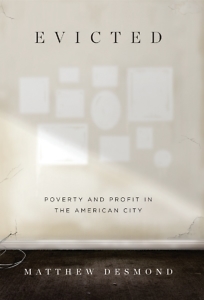Matthew Desmond’s Evicted: Poverty and Profit in the American City is the rare book that not only tilts our understanding of how economic inequality gets perpetuated, but also reads like a novel. Desmond embedded himself in the lives of both poor renters and enterprising landlords in Milwaukee, and he renders their struggles with remarkable detail and intimacy. The housing market, we learn, fundamentally shapes the nature of poverty in urban America.
 Desmond is the John L. Loeb Associate Professor of the Social Sciences at Harvard University and a 2015 winner of a MacArthur “Genius” Grant. His previous books include the award-winning On the Fireline, and he has written for such publications as The New York Times, The New Yorker, and the Chicago Tribune. Prior to his forthcoming appearance at Nashville’s Southern Festival of Books, he answered questions about Evicted via email:
Desmond is the John L. Loeb Associate Professor of the Social Sciences at Harvard University and a 2015 winner of a MacArthur “Genius” Grant. His previous books include the award-winning On the Fireline, and he has written for such publications as The New York Times, The New Yorker, and the Chicago Tribune. Prior to his forthcoming appearance at Nashville’s Southern Festival of Books, he answered questions about Evicted via email:
Chapter 16: If many different factors contribute to poverty, why focus on evictions? How does looking at rental housing shape our understanding of poverty’s causes and consequences?
Matthew Desmond: Today, the majority of poor renting families are spending at least half of their income on housing—and one in four is spending over seventy percent just on rent and utilities. The lack of affordable housing is a wellspring for many social problems—from family and community instability to poor health—and evictions, which used to be rare in our country, are running through the city, acting like a cause, not just a condition, of poverty. We cannot hope to fix poverty in America if we continue to ignore the affordable-housing crisis.
Chapter 16: What was the greatest challenge in performing your ethnographic field work in Milwaukee? What was the greatest reward?
Desmond: The greatest reward was living alongside people facing incredible, weighty adversity—the pain of hunger, threats of violence, the shame of blatant racial discrimination—and responding with courage, ingenuity, humor, and spunk. The greatest challenge was moving away from those people.
Chapter 16: Evicted reconstructs scenes in people’s lives with vivid detail and drama. Yet you, as the author, are absent from these scenes, even as the reader understands that you are often witnessing and recording them. How and why did you keep yourself out of the narrative?
Desmond: I wanted readers to focus on the people I met in Milwaukee, not on me. My story doesn’t matter; theirs does because theirs is a story of one of the most morally urgent problems facing this nation: the stubborn persistence of poverty in America. I knew from an early point in the writing process that that meant abandoning first-person narration.
Chapter 16: You investigate the lives of both black and white poor people in Milwaukee. What are the similarities in their experiences with the rental housing market? What are the differences?
Desmond: Eviction affects the old and the young, the sick and able-bodied. But for poor women of color and their children, it has become ordinary. Walk into just about any urban housing court in America, and you can see who is disproportionately affected by this problem. Among Milwaukee renters, over one in five black women report having been evicted in their life, compared to one in fifteen white women. If incarceration had come to define the lives of men from impoverished black neighborhoods, eviction was shaping the lives of women. Poor black men are being locked up. Poor black women are being locked out.
The American legacy of racial inequality and ongoing forms of discrimination are central to this story. But lack of affordable housing in our cities and the growing number of Americans paying sixty, seventy percent of their income on housing is a widespread problem affecting white and black families, immigrant communities, the poor and (increasingly) the middle class. Today, one in five of all renting families in America spends over half of its income on housing costs.
Chapter 16: There are many characters in Evicted, but perhaps the most compelling is Arleen. What can we learn from her challenges? Do you see her as the central thread in your story?
Desmond: When I met Arleen, she was trying to raise two boys while spending over eighty percent of her income to rent a run-down apartment in a poor, inner-city neighborhood. The lack of affordable housing was a direct cause of her poverty. When you are paying so much of your income on rent, eviction is much more the result of inevitability than personal irresponsibility.
We learn from Arleen’s story the terrible choices many low-income mothers are facing today. Should I buy groceries or pay the rent? Where will my children go after we are evicted? We learn how the lack of affordable housing robs children of their reaching their full potential because they are bounced from one school to the other and how it squanders the talent and energy of mothers like Arleen who spend so much of their time searching in vain for a home they can afford. And we learn from Arleen what strength and quiet dignity look like in the face of adversity.
 Chapter 16: In the epilogue, you propose a substantial expansion of the federal housing-voucher program, so that it can cover all low-income families in need. Why this remedy? How would you respond to critics who see this as an impingement upon the free market?
Chapter 16: In the epilogue, you propose a substantial expansion of the federal housing-voucher program, so that it can cover all low-income families in need. Why this remedy? How would you respond to critics who see this as an impingement upon the free market?
Desmond: I would invite that critic to join me in housing court, full of families with children with no legal representation; or on a ride-along with eviction movers, piling families’ things on the sidewalk; or around the dinner table of exhausted, working parents staring down a pile of bills. No person with actual experience in the housing market—real-estate developers, landlords, renting families—would raise such a criticism because they all know that to address the affordable housing crisis, we need public-private partnerships that work. And that is exactly what the housing-voucher program is. Trouble is, only one in four families who qualify for housing assistance receive it because the program doesn’t come close to meeting the need. And in some of our larger cities, the waiting list for public housing is counted in decades. That means in some areas of the country, young parents who apply for public housing today will probably be grandparents when their application is finally reviewed.
A universal housing-voucher program would fundamentally change the face of poverty in America, driving down family homelessness and making evictions rare again. When families finally receive a housing voucher after years on the waiting list—when they finally obtain this ticket that allows them to pay a modest thirty percent of their income on housing—they do one consistent thing with their freed-up income: they take it to the grocery store and buy more food. Their children become stronger, healthier. But the majority of poor renting families aren’t so lucky, and their kids don’t get enough to eat because the rent eats first. In this rich land, that situation is not only unnecessary; it is morally unacceptable.

Aram Goudsouzian chairs the history department at the University of Memphis. His most recent book is Down to the Crossroads: Civil Rights, Black Power, and the Meredith March Against Fear.





